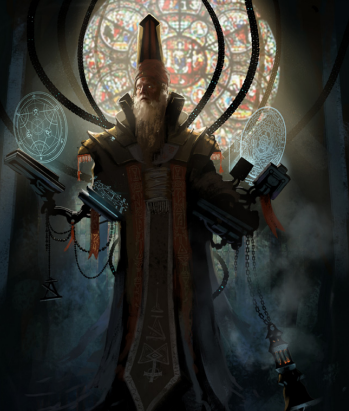
Humans are unique among the sapient species of Novus Æterno, in that they have always believed themselves to be beings existing simultaneously in two separate but intertwined universes: the physical and the metaphysical. By the time humans developed the scientific and academic tools required to seek even a most basic understanding of their physical universe and its laws, they had already spent centuries striving to understand the nature of their metaphysical universe using the tools they’d acquired through long traditions of spirituality, mysticism, and faith.
The deep, defining beliefs a human may derive from a devoted quest for metaphysical understanding can often rival, and even surpass, friendship and family as a driving motivational engine. This human thirst for knowledge of the unknown and perhaps unknowable, in particular the search for answers regarding an existence beyond physical life, coupled with the desire to form social bonds, gave rise to the phenomenon of mass, organized religious faith, which has long been a defining characteristic of human culture. Many of these “organized religions” evolved into formidable socioeconomic and political institutions over time, often transcending the rise and fall of powerful empires throughout the annals of human history. In fact, in many instances, these religious institutions gained influence and strength in direct proportion to a given empire’s wane, as humans tend to seek metaphysical enlightenment with increased fervor whenever their physical existence seems threatened to a significant degree. Such is the case for the incredibly influential and far-reaching human faction known as the Zealots.

In the early days of human expansion throughout the Novus Æterno universe, the process of exploration and colonization was handled by a select few under the watchful eyes of a group of centralized human governments. But once large, permanent colonies began to thrive on distant worlds—and once these colonies began to develop potentially profitable industries—corporations were encouraged to venture out into these new markets in order to drive the massive economy that allowed these human empires to enjoy sustained growth.
As more and more humans moved out among the stars, many brought their religions with them. Almost immediately, some of the more powerful religious institutions, like that of the Zealots themselves, began to send missionaries and ambassadors to the farthest reaches of space in order to bring food, medical aid, and spiritual guidance to the outlying colonies at the edges of the endless new frontier.
When the first inter-species wars began to isolate remote human outposts from the central governments and their resources, the Zealots began to take on a larger role, providing security for, and eventually maintaining some semblance of authority over, the millions of human colonists who flocked to the Zealots’ ever expanding communes and joined their pious ranks. The feverish xenophobia that gripped human colonists as they encountered strange and often hostile alien beings only served to fuel these mass conversions. As it had so many times before throughout human history, the perception of grave physical danger had spurred a retreat into the arms of those who champion the metaphysical.
With the once mighty human empires now reduced to dancing shadows on a zoetrope of flickering memories, the Zealots have grown more powerful than ever before, and their vast material resources, coupled with their sheer numbers, make them a force to be reckoned with for anyone who chooses to oppose them, human or otherwise.
